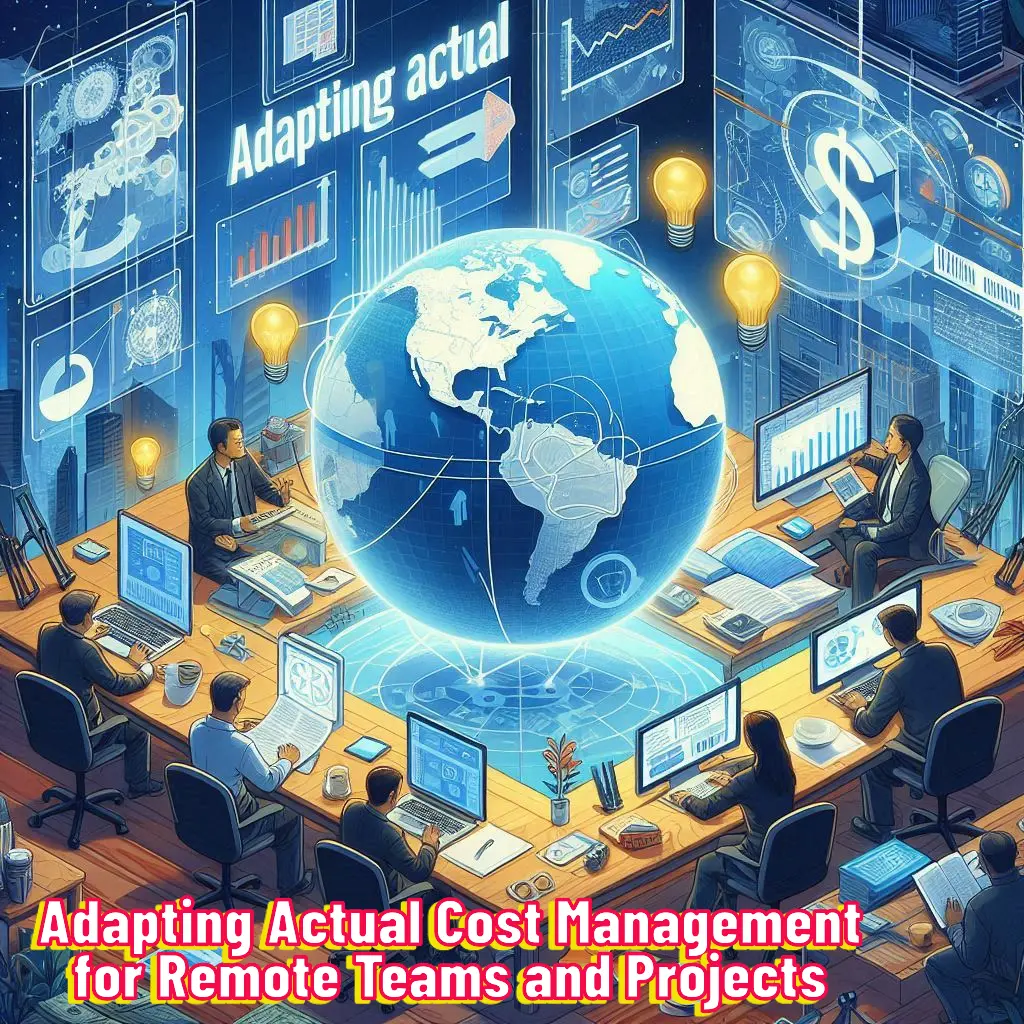Introduction to Actual Cost Management
In the realm of project management, particularly in remote environments, understanding and managing actual costs (AC) is crucial for ensuring project success. This section aims to provide a foundational understanding of actual cost management, highlighting its definition, significance, and traditional practices.
Definition of Actual Cost (AC) in Project Management
Actual Cost (AC) refers to the total expenses incurred for a project at a specific point in time. It encompasses all costs associated with project activities, including direct costs (like labor and materials) and indirect costs (such as overhead). In project management, AC is a key metric used to assess financial performance and is often compared against planned costs to evaluate budget adherence.
Importance of Actual Cost Tracking for Project Success
Tracking actual costs is vital for several reasons:
- Budget Control: By monitoring actual costs, project managers can identify variances between planned and actual expenditures, allowing for timely adjustments to stay within budget [6].
- Performance Measurement: Actual cost data provides insights into project performance, enabling managers to assess efficiency and effectiveness in resource utilization [11].
- Informed Decision-Making: Accurate tracking of actual costs supports better decision-making regarding resource allocation, project adjustments, and future planning [12].
- Stakeholder Communication: Regular updates on actual costs help maintain transparency with stakeholders, fostering trust and facilitating informed discussions about project status [10].
Overview of Traditional Cost Management Practices
Traditional cost management practices involve a systematic approach to estimating, budgeting, and controlling costs throughout the project lifecycle. Key components include:
- Cost Estimation: This initial phase involves assessing the resources and expenses necessary to complete the project, forming the basis for the project budget [3].
- Budget Development: A project budget is created based on cost estimates, serving as a financial blueprint for project execution [2].
- Cost Control: Throughout the project, managers continuously monitor actual costs against the budget, making adjustments as necessary to mitigate overspending [6][8].
In remote project environments, these traditional practices may face unique challenges, such as communication barriers and the need for real-time data sharing. Understanding actual cost management is essential for remote project managers and team leaders to navigate these challenges effectively and ensure project success.
Challenges of Actual Cost Management in Remote Projects
Managing actual costs in remote project environments presents a unique set of challenges that project managers and team leaders must navigate effectively. As remote work becomes more prevalent, understanding these challenges is crucial for maintaining financial control and ensuring project success. Here are some key challenges faced by remote teams in managing actual costs:
- Communication Barriers Affecting Cost Reporting: In a remote setup, effective communication is vital for accurate cost reporting. However, team members may face difficulties in conveying financial updates or discrepancies due to varying communication styles and tools. Misunderstandings can lead to inaccurate reporting, which complicates budget management and decision-making processes [1].
- Time Zone Differences Complicating Project Updates: Remote teams often operate across multiple time zones, which can hinder timely project updates and discussions about costs. Scheduling meetings that accommodate all team members can be challenging, leading to delays in addressing cost-related issues. This can result in a lack of alignment on budget status and financial decisions, ultimately affecting project outcomes [2].
- Difficulty in Accessing Real-Time Data and Resources: Remote teams may struggle to access real-time data and resources necessary for effective cost management. Without immediate access to financial information, project managers may find it difficult to track expenses accurately and make informed decisions. This lack of visibility can lead to overspending or misallocation of resources, further complicating budget management [3].
- Increased Risk of Budget Overruns Due to Lack of Oversight: The remote work environment can create challenges in oversight and accountability, increasing the risk of budget overruns. With team members working independently, it may be harder for project managers to monitor spending closely. This lack of oversight can lead to unapproved expenses or deviations from the budget, ultimately jeopardizing the project’s financial health [4].
Communication Barriers Affecting Cost Reporting: In a remote setup, effective communication is vital for accurate cost reporting. However, team members may face difficulties in conveying financial updates or discrepancies due to varying communication styles and tools. Misunderstandings can lead to inaccurate reporting, which complicates budget management and decision-making processes [1].
Time Zone Differences Complicating Project Updates: Remote teams often operate across multiple time zones, which can hinder timely project updates and discussions about costs. Scheduling meetings that accommodate all team members can be challenging, leading to delays in addressing cost-related issues. This can result in a lack of alignment on budget status and financial decisions, ultimately affecting project outcomes [2].
Difficulty in Accessing Real-Time Data and Resources: Remote teams may struggle to access real-time data and resources necessary for effective cost management. Without immediate access to financial information, project managers may find it difficult to track expenses accurately and make informed decisions. This lack of visibility can lead to overspending or misallocation of resources, further complicating budget management [3].
Increased Risk of Budget Overruns Due to Lack of Oversight: The remote work environment can create challenges in oversight and accountability, increasing the risk of budget overruns. With team members working independently, it may be harder for project managers to monitor spending closely. This lack of oversight can lead to unapproved expenses or deviations from the budget, ultimately jeopardizing the project’s financial health [4].
In summary, remote project managers must be aware of these challenges and develop strategies to mitigate their impact on actual cost management. By fostering clear communication, leveraging technology for real-time data access, and implementing robust oversight mechanisms, teams can navigate the complexities of managing actual costs in a remote environment effectively.
Strategies for Effective Actual Cost Management in Remote Teams
Managing actual costs in remote project environments presents unique challenges that require tailored strategies. Here are actionable approaches that remote project managers and team leaders can implement to ensure effective cost management:
- Implementing Robust Digital Project Management Tools: Utilizing advanced project management software is essential for tracking actual costs in real-time. These tools can help in monitoring expenses, managing budgets, and providing visibility into financial performance. Features such as expense tracking, budget forecasting, and reporting capabilities allow teams to stay aligned and informed about their financial status, which is crucial in a remote setting where face-to-face interactions are limited [4][9].
- Establishing Clear Communication Protocols for Cost Reporting: Effective communication is vital for managing actual costs, especially in a remote environment. Establishing clear protocols for cost reporting ensures that all team members understand how and when to report expenses. Regular updates and open lines of communication can help identify discrepancies early and facilitate timely corrective actions. This clarity helps in maintaining accountability and ensures that everyone is on the same page regarding financial expectations [3][10].
- Regularly Scheduled Budget Reviews and Updates: Conducting frequent budget reviews is critical for adapting to changes in project scope or unforeseen expenses. Setting a regular schedule for budget assessments allows teams to compare actual costs against the planned budget, identify variances, and make necessary adjustments. This proactive approach helps in mitigating the risk of budget overruns and ensures that the project remains financially viable [2][4].
- Encouraging Accountability and Transparency Among Team Members: Fostering a culture of accountability and transparency is essential for effective cost management. Encouraging team members to take ownership of their budgetary responsibilities can lead to more mindful spending and better resource allocation. Transparency in financial reporting and decision-making processes builds trust within the team and promotes a collaborative approach to managing costs [3][9].
Implementing Robust Digital Project Management Tools: Utilizing advanced project management software is essential for tracking actual costs in real-time. These tools can help in monitoring expenses, managing budgets, and providing visibility into financial performance. Features such as expense tracking, budget forecasting, and reporting capabilities allow teams to stay aligned and informed about their financial status, which is crucial in a remote setting where face-to-face interactions are limited [4][9].
Establishing Clear Communication Protocols for Cost Reporting: Effective communication is vital for managing actual costs, especially in a remote environment. Establishing clear protocols for cost reporting ensures that all team members understand how and when to report expenses. Regular updates and open lines of communication can help identify discrepancies early and facilitate timely corrective actions. This clarity helps in maintaining accountability and ensures that everyone is on the same page regarding financial expectations [3][10].
Regularly Scheduled Budget Reviews and Updates: Conducting frequent budget reviews is critical for adapting to changes in project scope or unforeseen expenses. Setting a regular schedule for budget assessments allows teams to compare actual costs against the planned budget, identify variances, and make necessary adjustments. This proactive approach helps in mitigating the risk of budget overruns and ensures that the project remains financially viable [2][4].
Encouraging Accountability and Transparency Among Team Members: Fostering a culture of accountability and transparency is essential for effective cost management. Encouraging team members to take ownership of their budgetary responsibilities can lead to more mindful spending and better resource allocation. Transparency in financial reporting and decision-making processes builds trust within the team and promotes a collaborative approach to managing costs [3][9].
By implementing these strategies, remote project managers can navigate the complexities of actual cost management, ensuring that their projects remain on track financially while fostering a productive and engaged remote team environment.
Utilizing Technology for Cost Tracking
In the realm of project management, particularly for remote teams, effectively managing actual costs is crucial for ensuring projects remain within budget and meet their objectives. The integration of technology into cost management processes can significantly enhance the ability to track, report, and control expenses. Here are some key points to consider:
Overview of Popular Tools and Software for Cost Management
Several tools and software solutions are designed specifically for cost management in project environments. These include:
- Jira: Known for its project tracking capabilities, Jira also offers features for tracking costs associated with tasks, making it easier to log actual costs against project activities [3].
- Trello: While primarily a task management tool, Trello can be enhanced with power-ups that allow for cost tracking and budgeting, providing a visual overview of expenses [1].
- Microsoft Project: This comprehensive project management software includes robust cost management features, allowing project managers to estimate, track, and analyze costs effectively [1].
- Asana: Asana’s integration capabilities allow for cost tracking through various add-ons, enabling teams to monitor expenses alongside project tasks [1].
Benefits of Real-Time Tracking and Reporting Features
Real-time tracking and reporting are essential for remote project teams, as they provide immediate insights into actual costs incurred. The benefits include:
- Immediate Visibility: Real-time data allows project managers to see how much has been spent at any given moment, facilitating timely decision-making and adjustments to keep the project on budget [2].
- Enhanced Accountability: With real-time tracking, team members can be held accountable for their spending, as costs are logged and reported as they occur [2].
- Proactive Management: By having access to up-to-date financial information, project managers can identify potential budget overruns early and take corrective actions before they escalate [9].
Integrating Cost Management Tools with Other Project Management Platforms
To maximize efficiency, it is vital to integrate cost management tools with other project management platforms. This integration can lead to:
- Streamlined Processes: By connecting cost management tools with project management software, teams can ensure that all aspects of the project are aligned, reducing the risk of discrepancies between planned and actual costs [11].
- Centralized Data: Integration allows for a single source of truth, where all project-related data, including costs, timelines, and resources, can be accessed in one place, enhancing collaboration among remote team members [11].
- Improved Reporting: When cost management tools are integrated with project management platforms, generating comprehensive reports becomes easier, providing stakeholders with clear insights into project performance and financial health [7].
In conclusion, leveraging technology for actual cost management is essential for remote project teams. By utilizing the right tools, embracing real-time tracking, and ensuring seamless integration with other project management systems, project managers can navigate the complexities of managing actual costs effectively, ultimately leading to successful project outcomes.
Fostering a Culture of Cost Awareness
In the realm of remote project management, fostering a culture of cost awareness is essential for maintaining budget adherence and optimizing project performance. As teams operate from various locations, the challenges of managing actual costs become more pronounced. Here are some key strategies to cultivate a cost-conscious mindset within remote teams:
- Training Team Members on Financial Literacy and Cost Management: It is crucial to equip team members with the knowledge and skills necessary to understand financial metrics, including actual costs. Providing training sessions on financial literacy can help team members grasp the significance of cost management in project success. This understanding enables them to make informed decisions that align with budgetary constraints and project goals. By emphasizing the importance of metrics such as Actual Cost (AC) and Cost Performance Index (CPI), team members can better appreciate their role in managing project finances effectively [3][4].
- Setting Clear Expectations Regarding Budget Adherence: Establishing clear expectations around budget adherence is vital for remote teams. Project managers should communicate the budgetary limits and the importance of staying within these constraints from the outset. Regular updates and discussions about actual costs versus planned costs can help keep the team focused on financial performance. By integrating cost management into daily operations, team members will be more likely to prioritize budget adherence and understand the implications of their spending decisions [1][8].
- Recognizing and Rewarding Cost-Saving Initiatives: Encouraging a proactive approach to cost management can be achieved by recognizing and rewarding team members who contribute to cost-saving initiatives. This could involve acknowledging innovative ideas that lead to reduced expenses or celebrating milestones where the team successfully stayed under budget. By fostering an environment where cost-saving efforts are valued, project managers can motivate team members to think creatively about how to manage resources efficiently. This not only enhances team morale but also reinforces the importance of cost awareness in achieving project success [2][6].
Training Team Members on Financial Literacy and Cost Management: It is crucial to equip team members with the knowledge and skills necessary to understand financial metrics, including actual costs. Providing training sessions on financial literacy can help team members grasp the significance of cost management in project success. This understanding enables them to make informed decisions that align with budgetary constraints and project goals. By emphasizing the importance of metrics such as Actual Cost (AC) and Cost Performance Index (CPI), team members can better appreciate their role in managing project finances effectively [3][4].
Setting Clear Expectations Regarding Budget Adherence: Establishing clear expectations around budget adherence is vital for remote teams. Project managers should communicate the budgetary limits and the importance of staying within these constraints from the outset. Regular updates and discussions about actual costs versus planned costs can help keep the team focused on financial performance. By integrating cost management into daily operations, team members will be more likely to prioritize budget adherence and understand the implications of their spending decisions [1][8].
Recognizing and Rewarding Cost-Saving Initiatives: Encouraging a proactive approach to cost management can be achieved by recognizing and rewarding team members who contribute to cost-saving initiatives. This could involve acknowledging innovative ideas that lead to reduced expenses or celebrating milestones where the team successfully stayed under budget. By fostering an environment where cost-saving efforts are valued, project managers can motivate team members to think creatively about how to manage resources efficiently. This not only enhances team morale but also reinforces the importance of cost awareness in achieving project success [2][6].
In conclusion, adapting actual cost management for remote teams requires a concerted effort to foster a culture of cost awareness. By investing in training, setting clear expectations, and recognizing cost-saving initiatives, remote project managers can navigate the challenges of managing actual costs effectively, ensuring that projects remain on track and within budget.
Conclusion and Key Takeaways
In the evolving landscape of project management, particularly within remote teams, understanding and managing actual costs has become increasingly critical. As we navigate the complexities of virtual collaboration, several challenges and strategies have emerged that are essential for effective actual cost management.
Recap of the Challenges and Strategies Discussed
Remote project managers often face unique hurdles when it comes to tracking and managing actual costs. Key challenges include:
- Communication Barriers: The lack of face-to-face interaction can lead to misunderstandings regarding budget allocations and expenditures, making it difficult to maintain accurate cost tracking [6].
- Time Zone Differences: Coordinating across various time zones can complicate timely updates and discussions about budget status, potentially leading to delays in addressing cost overruns [15].
- Resource Allocation: Ensuring that resources are effectively allocated and utilized in a remote setting can be challenging, impacting the overall project budget [6].
To address these challenges, several strategies have been recommended:
- Implementing Robust Cost Tracking Systems: Utilizing real-time cost tracking tools can help teams monitor actual costs against estimates, allowing for timely adjustments and better financial management [6].
- Regular Communication and Updates: Establishing a routine for financial check-ins can help keep all team members informed about budget status and any necessary changes [6].
- Training and Best Practices: Encouraging team members to adopt best practices in cost management can enhance overall project outcomes and ensure that everyone is aligned on financial goals [9].
Final Thoughts on the Future of Actual Cost Management in Remote Teams
As remote work continues to be a prevalent model, the future of actual cost management will likely involve more sophisticated tools and methodologies. The integration of advanced analytics and AI-driven insights may provide project managers with deeper visibility into cost trends and potential issues before they escalate. Additionally, fostering a culture of transparency and accountability within remote teams will be crucial for maintaining budget discipline and achieving project success.



